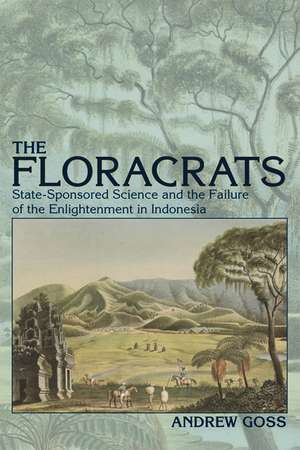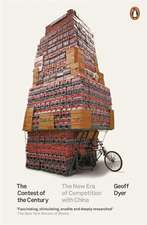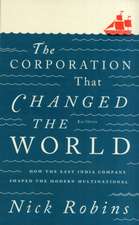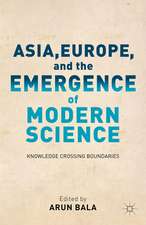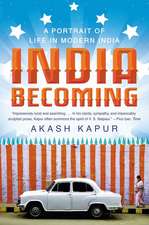The Floracrats: State-Sponsored Science and the Failure of the Enlightenment in Indonesia: New Perspectives in SE Asian Studies
Autor Andrew Gossen Limba Engleză Paperback – 31 ian 2011
Situated along the line that divides the rich ecologies of Asia and Australia, the Indonesian archipelago is a hotbed for scientific exploration, and scientists from around the world have made key discoveries there. But why do the names of Indonesia’s own scientists rarely appear in the annals of scientific history? In The Floracrats Andrew Goss examines the professional lives of Indonesian naturalists and biologists, to show what happens to science when a powerful state becomes its greatest, and indeed only, patron.
With only one purse to pay for research, Indonesia’s scientists followed a state agenda focused mainly on exploiting the country’s most valuable natural resources—above all its major export crops: quinine, sugar, coffee, tea, rubber, and indigo. The result was a class of botanic bureaucrats that Goss dubs the “floracrats.” Drawing on archives and oral histories, he shows how these scientists strove for the Enlightenment ideal of objective, universal, and useful knowledge, even as they betrayed that ideal by failing to share scientific knowledge with the general public. With each chapter, Goss details the phases of power and the personalities in Indonesia that have struggled with this dilemma, from the early colonial era, through independence, to the modern Indonesian state. Goss shows just how limiting dependence on an all-powerful state can be for a scientific community, no matter how idealistic its individual scientists may be.
With only one purse to pay for research, Indonesia’s scientists followed a state agenda focused mainly on exploiting the country’s most valuable natural resources—above all its major export crops: quinine, sugar, coffee, tea, rubber, and indigo. The result was a class of botanic bureaucrats that Goss dubs the “floracrats.” Drawing on archives and oral histories, he shows how these scientists strove for the Enlightenment ideal of objective, universal, and useful knowledge, even as they betrayed that ideal by failing to share scientific knowledge with the general public. With each chapter, Goss details the phases of power and the personalities in Indonesia that have struggled with this dilemma, from the early colonial era, through independence, to the modern Indonesian state. Goss shows just how limiting dependence on an all-powerful state can be for a scientific community, no matter how idealistic its individual scientists may be.
Din seria New Perspectives in SE Asian Studies
-
 Preț: 180.00 lei
Preț: 180.00 lei -
 Preț: 230.41 lei
Preț: 230.41 lei -
 Preț: 221.78 lei
Preț: 221.78 lei -
 Preț: 161.02 lei
Preț: 161.02 lei -
 Preț: 262.04 lei
Preț: 262.04 lei -
 Preț: 239.09 lei
Preț: 239.09 lei -
 Preț: 201.80 lei
Preț: 201.80 lei -
 Preț: 258.73 lei
Preț: 258.73 lei -
 Preț: 127.40 lei
Preț: 127.40 lei - 23%
 Preț: 482.73 lei
Preț: 482.73 lei - 23%
 Preț: 475.36 lei
Preț: 475.36 lei -
 Preț: 190.69 lei
Preț: 190.69 lei - 15%
 Preț: 587.30 lei
Preț: 587.30 lei - 23%
 Preț: 480.38 lei
Preț: 480.38 lei -
 Preț: 217.92 lei
Preț: 217.92 lei -
 Preț: 202.78 lei
Preț: 202.78 lei -
 Preț: 220.64 lei
Preț: 220.64 lei - 23%
 Preț: 444.55 lei
Preț: 444.55 lei -
 Preț: 239.28 lei
Preț: 239.28 lei -
 Preț: 231.15 lei
Preț: 231.15 lei -
 Preț: 230.56 lei
Preț: 230.56 lei - 23%
 Preț: 472.22 lei
Preț: 472.22 lei - 23%
 Preț: 534.08 lei
Preț: 534.08 lei -
 Preț: 220.03 lei
Preț: 220.03 lei - 23%
 Preț: 474.60 lei
Preț: 474.60 lei - 23%
 Preț: 473.84 lei
Preț: 473.84 lei - 19%
 Preț: 440.55 lei
Preț: 440.55 lei
Preț: 153.45 lei
Nou
Puncte Express: 230
Preț estimativ în valută:
29.37€ • 31.89$ • 24.67£
29.37€ • 31.89$ • 24.67£
Carte disponibilă
Livrare economică 02-16 aprilie
Preluare comenzi: 021 569.72.76
Specificații
ISBN-13: 9780299248642
ISBN-10: 029924864X
Pagini: 264
Ilustrații: 14 b-w illus.
Dimensiuni: 152 x 229 x 20 mm
Greutate: 0.38 kg
Ediția:1
Editura: University of Wisconsin Press
Colecția University of Wisconsin Press
Seria New Perspectives in SE Asian Studies
ISBN-10: 029924864X
Pagini: 264
Ilustrații: 14 b-w illus.
Dimensiuni: 152 x 229 x 20 mm
Greutate: 0.38 kg
Ediția:1
Editura: University of Wisconsin Press
Colecția University of Wisconsin Press
Seria New Perspectives in SE Asian Studies
Recenzii
“A smart, elegant study of science in the East Indies, both in a time when Indonesia was Dutch, and when it finally reverted back to its own subject-citizens. The book is lively, clever, and well written.”—Eric Tagliacozzo, author of Secret Trades, Porous Borders: Smuggling and States along a Southeast Asian Frontier, 1865–1915
"Wielding sharp and subtle analytic skills, Andrew Goss meticulously tracks how, when, and why colonial biologists embraced the gospel of enlightenment, progress, and science."—Ann Laura Stoler, author of Carnal Knowledge and Imperial Power: Race and the Intimate in Colonial Rule
“For anyone interested in Indonesia and the fortunes of science under colonial and then authoritarian political regimes, this book offers a detailed case study well worth reading.”—CHOICE
“A marvelously crisp, subtle, and insightful vision of the architectural limitations and constraints of colonial and postcolonial authority and the society it blanketed. It is beautifully and sensitively researched, making fruitful, intelligent use of stubborn Dutch colonial and scientific archives and numerous other sources.”—R. E. Elson, Journal of American History
“Goss’s monograph . . . sheds fresh light on the relationship between various experts of nature and the colonial and post-colonial state.”—Bijdragen tot de Taal-, Land- en Volkenkunde
“A detailed examination of the development of scientific research and institutions in Indonesia since the nineteenth century. . . . Its boldness makes this an important book, one that should be read by anyone interested in colonial history, science and modern governmental systems in not only Indonesia, but all of Southeast Asia.”—Timothy P. Barnard, The Journal of Southeast Asian Studies
Notă biografică
Andrew Goss is assistant professor of history at the University of New Orleans.
Cuprins
List of Figures
Preface
Introduction
1. Apostles of Enlightenment
2. Quinine Science
3.Treub's Beautiful Science
4. Ethical Professionals
5. The Nationalists' Enlightenment
6. Van Mook's Technocracy
7. Desk Science
Conclusion
Preface
Introduction
1. Apostles of Enlightenment
2. Quinine Science
3.Treub's Beautiful Science
4. Ethical Professionals
5. The Nationalists' Enlightenment
6. Van Mook's Technocracy
7. Desk Science
Conclusion
Descriere
Situated along the line that divides the rich ecologies of Asia and Australia, the Indonesian archipelago is a hotbed for scientific exploration, and scientists from around the world have made key discoveries there. But why do the names of Indonesia’s own scientists rarely appear in the annals of scientific history? In The Floracrats Andrew Goss examines the professional lives of Indonesian naturalists and biologists, to show what happens to science when a powerful state becomes its greatest, and indeed only, patron.
With only one purse to pay for research, Indonesia’s scientists followed a state agenda focused mainly on exploiting the country’s most valuable natural resources—above all its major export crops: quinine, sugar, coffee, tea, rubber, and indigo. The result was a class of botanic bureaucrats that Goss dubs the “floracrats.” Drawing on archives and oral histories, he shows how these scientists strove for the Enlightenment ideal of objective, universal, and useful knowledge, even as they betrayed that ideal by failing to share scientific knowledge with the general public. With each chapter, Goss details the phases of power and the personalities in Indonesia that have struggled with this dilemma, from the early colonial era, through independence, to the modern Indonesian state. Goss shows just how limiting dependence on an all-powerful state can be for a scientific community, no matter how idealistic its individual scientists may be.
With only one purse to pay for research, Indonesia’s scientists followed a state agenda focused mainly on exploiting the country’s most valuable natural resources—above all its major export crops: quinine, sugar, coffee, tea, rubber, and indigo. The result was a class of botanic bureaucrats that Goss dubs the “floracrats.” Drawing on archives and oral histories, he shows how these scientists strove for the Enlightenment ideal of objective, universal, and useful knowledge, even as they betrayed that ideal by failing to share scientific knowledge with the general public. With each chapter, Goss details the phases of power and the personalities in Indonesia that have struggled with this dilemma, from the early colonial era, through independence, to the modern Indonesian state. Goss shows just how limiting dependence on an all-powerful state can be for a scientific community, no matter how idealistic its individual scientists may be.
